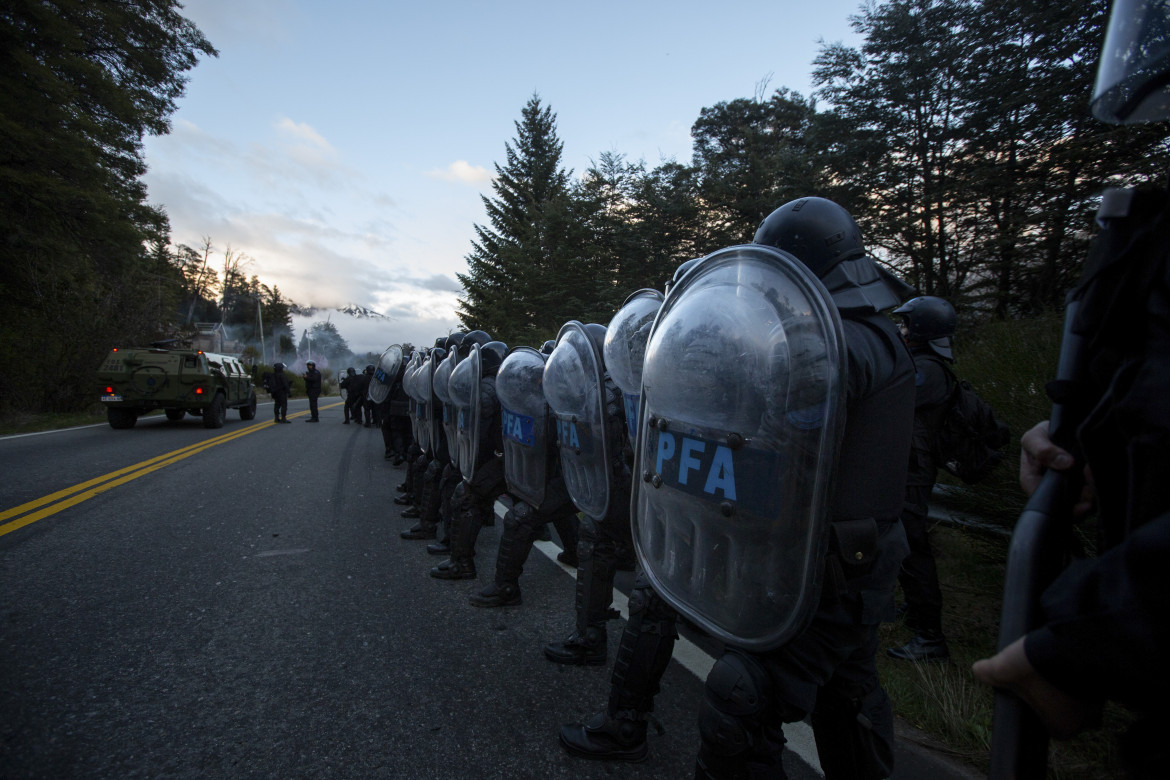Analysis
Mapuche under attack in Argentina, recalling the military dictatorship
Human rights organizations have come out against the tightening of repressive policies, reminding in a joint statement that ‘the rights of the original peoples are enshrined in the Constitution and must be respected.’

The “Conquest of the Desert,” as the military campaign undertaken by the Argentine government in the second half of the 19th century to wrest Patagonia from the Mapuche was called, is not just a distant memory. That conquest is still ongoing, and this was shown in the clearest way by the violent eviction of the Lafken Winkul Mapuche community in Villa Mascardi, Río Negro province.
Over 250 agents of the federal police carried out the eviction operation. In the early hours of the morning of Oct. 4, they entered with guns blazing into the area occupied in 2017 by the Mapuche community in a “territorial recovery” action. And they began targeting the men, women and children who happened to be there, setting fire to houses and arresting seven women, who are now being charged with arson, attack against authorities and usurpation and will likely be tried under the controversial Anti-Terrorist Law.
Of the seven women, four – Luciana Jaramillo, Andrea Despo, Florencia Melo and Débora Vera – were transferred, by order of Federal Judge Silvina Domínguez, without even informing their lawyers, to Ezeiza Prison in Buenos Aires, 1,600 kilometers away from their families. From the others, two (machi Betiana Colhuan and María Celeste Guenumil) stayed in Río Negro, at the airport police headquarters, with their newborn children to breastfeed, and the last one (Romina Rosas) was hospitalized for an unsafe pregnancy. “All this reminds us of the era of the genocide, or that of the military dictatorship,” denounced Mara Bou of the Permanent Assembly for Human Rights (APDH) in Bariloche.
The version given by Security Minister Aníbal Fernández is very different: according to him, the operation was a “positive” development, conducted “with all due care and without lethal weapons”: the evacuated families, he said, did not suffer “even a scratch.” The same view was taken by the Río Negro governor, Arabela Carreras, who had sided with Joe Lewis, the British tycoon who not only illegally appropriated the property around the beautiful Lago Escondido, but is preventing the population from even visiting it. The same governor, faced with a court ruling that forced the billionaire to allow access to the lake, saw fit to file an appeal, before even consulting with her lawyers.
However, Fernández’s version did not convince Women, Gender and Diversity Minister Elizabeth Gómez Alcorta, who, after expressing concern over the arrests of the seven women, submitted her resignation on Thursday.
In the background is the growing demonization – particularly violent in Río Negro – of the Mapuche people, considered by the right-wingers “a real and concrete threat to the territorial integrity” of the country; a principle which has been violated with impunity, with their blessing, by the likes of Lewis and Benetton.
In a surprising turn, even Carlos Menem’s former vice president Carlos Ruckauf, to take just one example, lashed out at what he described as “a group that by means of rampant violence, disregarding national and provincial authority, is attempting, with its own flag and anthem, to expel the legitimate owners from their homes.”
“Just like Putin with the Donetsk and Luhansk republics,” he claimed, the Mapuche supposedly “first occupy land, then contrive referendums and finally steal it.” For Ruckauf, all initiatives for the recovery of the natives’ lands are “theft.”
On the other hand, human rights organizations – Abuelas de Plaza de Mayo, Madres Línea Fundadora, Hijos, APDH, and the Centro de Estudios Legales y Sociales, to name but a few – have come out against the tightening of repressive policies, reminding in a joint statement that “the rights of the original peoples are enshrined in the Constitution and must be respected.”
The NGOs denounce that while the Macri government and its Security Minister Patricia Bullrich had been responsible for crimes ”which still await justice,” such as the disappearance and death of Santiago Maldonado in the Cushamen area or the assassination of Rafael Nahuel in the same Villa Mascardi area, “it is worrying” that the government of Alberto Fernández is following the same path. The NGOs are clamoring for the setup of “a negotiation process that would include all sectors.”
Another figure calling for dialogue is the coordinator of the Mapuche-Tehuelche Parliament of Río Negro, Orlando Carriqueo, who, while pointing out that “violence in this territory has always been imposed by the state,” urged the national and provincial governments to start negotiations on October 12, coinciding with the Day of Respect for Cultural Diversity, not only about the situation in Villa Mascardi, but also about other territorial conflicts.
“Despite the genocide and the hundred years of institutional violence we have been subjected to,” and at a time when “we are being discriminated against and accused of terrorism,” Carriqueo said, “we are willing to follow the path of dialogue. If the state won’t accept, that means it wants conflict.”
Originally published at https://ilmanifesto.it/mapuche-sotto-attacco-in-argentina-villa-mascardi-conquistata-con-la-forza on 2022-10-09
